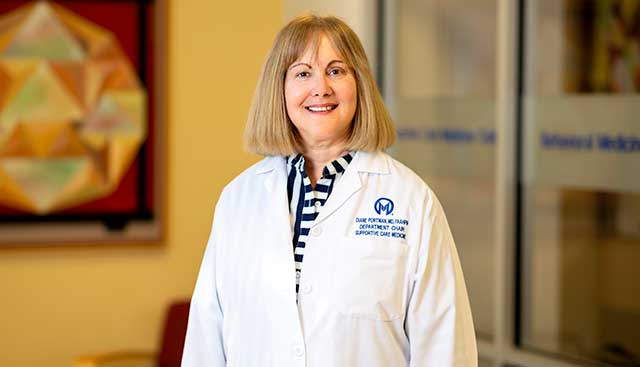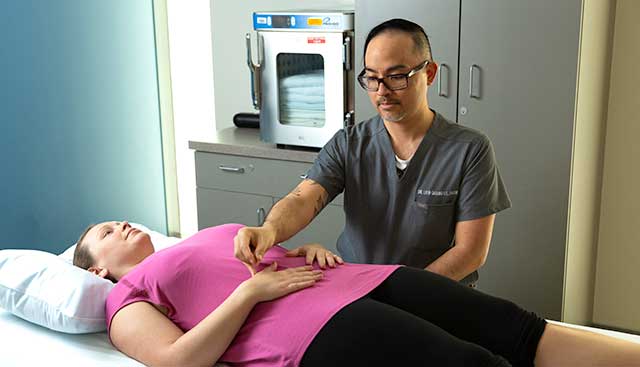The Team of Support: Moffitt’s Supportive Care Medicine Department Collaborates to Care for the Whole Patient
Cancer’s effects aren’t limited to the malignancy. Its diagnosis and treatment can trigger physical symptoms from sleep disturbance to nausea. It can leave patients depressed, anxious or distanced from friends who don’t know how to react. And it sometimes raises existential questions and crises of faith. Helping to relieve these stressors is the role of Moffitt’s Department of Supportive Care Medicine. Its chair, Diane Portman, M.D., oversees more than 40 team members in both the inpatient and outpatient setting. They have varied areas of expertise and work together as a team to effectively address the multiple challenges faced by patients and caregivers. Their work, she says, can be affectionately referred to as a “team sport.” But she’s quick to add, "This department is but a part of the endeavor." Its members collaborate closely with physicians, nurses, social workers, chaplains and many others throughout Moffitt to evaluate patient referrals and deliver care.

Supportive/palliative care is specialized medical care to relieve what’s known as “total pain,” whether physical, emotional, social or spiritual. Left unattended, this multifaceted pain is a platform for utter misery. When these issues are addressed, patients can more easily face and manage their cancer journey. ER visits and hospital stays can be avoided, and care can be aligned with patients’ specific goals, values and priorities. It also benefits the institution by reducing the use of unnecessary resources. Supportive care can be provided together with curative and life-prolonging treatment. It’s about more care — not less. And it’s offered at any time, from diagnosis throughout the spectrum of care, wherever the cancer journey takes the patient.
In the past, Portman says, oncologists themselves provided for a patient’s primary supportive care needs within their practice. Many still do today. But the field of oncology is becoming ever more complex. “Every day, there are multiple new drugs. There are multiple new developments in molecular or genetic understanding of the disease,” she explains. “The amount of knowledge, skill and expertise required for oncologists to keep up with that can seem insurmountable at times.” Add all the other dimensions of care that are required to keep patients feeling well through their journey, and Portman says it clearly can’t be done by a single care team or one individual. “You really need multiple forms of support. Moffitt has recognized that having a supportive care department to collaborate with the disease-state departments on an equal footing is one of the optimal ways to do this. It’s a relatively unique approach compared to other cancer centers across the country.”
The department is organized into three distinct sections: Behavioral Medicine, Integrative Medicine and Supportive/ Palliative Care Medicine.
The Behavioral Medicine section is home to Aliya Hafeez, M.D., as well as two other psychiatrists and three PhD-trained psychologists. They offer medication management, therapy and counseling to help reduce and manage anxiety, depression, sleep problems and other stressors or coping challenges.
Integrative Medicine is devoted to improving health and well-being through complementary therapies such as mindfulness and meditation techniques, acupuncture, yoga and massage therapy for stress reduction, relaxation, added comfort and relief. These modalities have been shown in multiple research studies to be beneficial when used in combination with traditional medical treatments. Practitioners are trained to work with the cancer patient population and collaborate with Moffitt medical providers.

Pain management is a good example of integrative care, especially in an opiate-challenged world. While the strong pain relievers have a valued place in helping cancer patients, Portman notes, “There are so many other techniques that can help augment pain control that don’t come in a syringe or a bottle.” Both acupuncture and massage therapy are endorsed by the National Institutes of Health for pain management. Both are offered through Integrative Medicine. And massage therapy, says Portman, is the section’s highest demand service among the inpatient population.
The Supportive/Palliative Care Medicine section is led by Portman, who is credentialed in anesthesiology, pain management and palliative care medicine. With six physicians and five advanced practice nurses, this section provides pain and symptom management throughout the course of illness to improve comfort, quality of life and daily function. The section’s social worker and a designated chaplain offer emotional, spiritual and practical support for adjusting to life with a serious illness. Team members also help patients with transitions of care and advanced care planning. They are specially trained to clarify patient goals of care in order to help teams provide treatments that best align with what patients express is most important to them.
Patients aren’t the only ones served by this section’s experts. Moffitt team members benefit from training that raises the bar for palliative care practices by all. “We teach pain and other symptom management,” Portman explains. “We offer communication skills training to master the ‘hard talks’ that all clinicians face with patients who are seriously ill. We provide specific training about end-of-life symptoms that all providers need to be familiar with and manage effectively.” Increasing the competence of all who do this work creates a greater comfort level among staff, makes the care more widely available and frees the Supportive/Palliative Care staff to deliver their specialized level of care when needed.
Together with physicians, a team of specially trained nurses staff the Supportive Care Medicine Outpatient Clinic, an especially busy service given Moffitt’s high volume of outpatient cancer care.
Patients access the department’s services by referral (outpatient) or consult (inpatient) from their primary oncology team. Supportive Care prompting measures are also being incorporated into Moffitt Clinical Pathways, decision support tools used to promote consistent, quality care. In all cases, the first step to obtaining services is an assessment of the patient’s condition and needs, to evaluate whether these needs can and should be handled by the department’s staff.
All these efforts have earned honors for the program. In 2014, The Joint Commission that accredits hospitals and health care organizations awarded Moffitt its first Certificate of Distinction in Advanced Palliative Care. The distinction is based on adherence to 151 parameters of quality care as established by national guidelines and demonstration of performance with metrics that measure aspects of care. Since 2014, Moffitt Supportive Care has attained recertification every two years. Moffitt is one of only eight National Cancer Institute-designated cancer centers in America — and one of only two Florida hospitals of any sort — to achieve this certification. In 2018, the American Hospital Association awarded Moffitt’s Department of Supportive Care Medicine a national Circle of Life Award Citation of Honor for strides and innovations in Supportive/Palliative Care. Only six awards are bestowed each year.
The honors are welcomed and well-deserved, but Portman is quick to add they’re a reflection on collaborative leadership and teamwork within her department and beyond to all of the Moffitt team members who work together to support our patients. “We’re proud, but we have a long way to go,” she adds. “There’s so much out there on a national level that we can adopt and adapt to our Moffitt culture to make things even better for our patients.”


